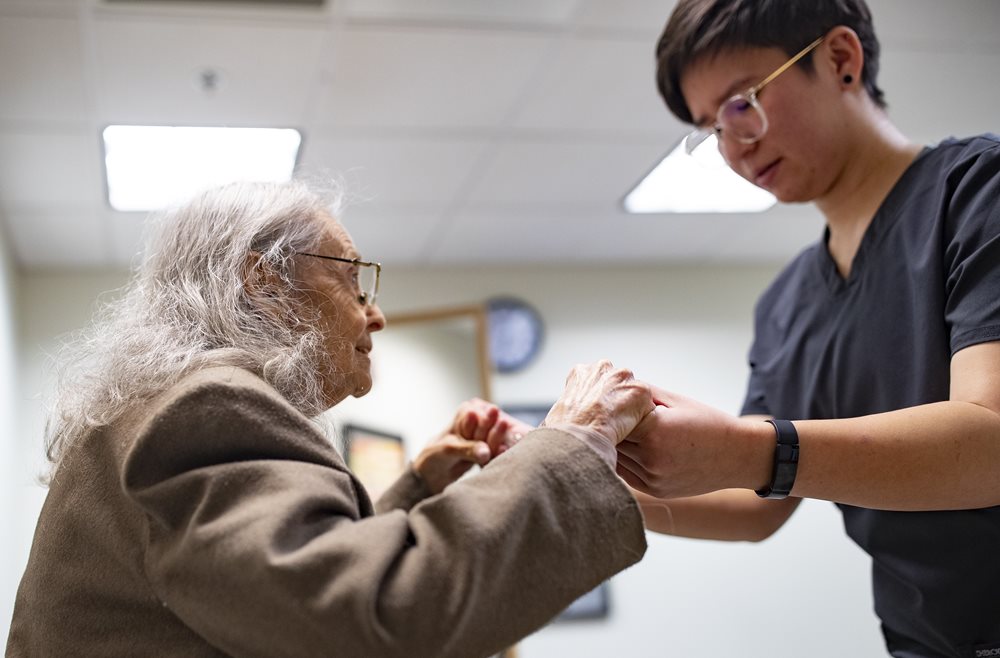Understanding and Supporting a Person with Alzheimer’s
 Alzheimer's disease is a progressive neurological disorder that causes the brain to shrink (atrophy) and brain cells to die. Alzheimer’s disease is a type of dementia, which is a term that describes memory loss symptoms and cognitive decline significant enough to interfere with daily life.
Alzheimer's disease is a progressive neurological disorder that causes the brain to shrink (atrophy) and brain cells to die. Alzheimer’s disease is a type of dementia, which is a term that describes memory loss symptoms and cognitive decline significant enough to interfere with daily life.
Symptoms to look out for include:
- Memory loss: People may forget things they have recently learned, including dates, names of people or things, and details of events. They might ask the same question several times and repeat details or stories.
- Confusion with time or place: People with Alzheimer’s often lose track of time. They may forget where they are and how they ended up there, which can lead to getting lost in familiar locations, periods of disorientation, and wandering.
- Trouble planning, organizing, or solving problems: Some people may experience changes in their ability to create and follow a plan. Even more familiar tasks like writing a check or taking one’s medications become more difficult.
- Communication struggles: People may find it challenging to find the correct words to express ideas. They might blank on common words and phrases or forget what they want to say.
- Misplacing things and being unable to retrace steps: Those with Alzheimer’s often misplace objects. They may put things in unusual places, something that can grow more frequent over time.
- Mood and personality changes: Because of the changes occurring in their brain, you may notice significant shifts in mood and personality. They might become confused, agitated, restless, suspicious, worried, and depressed.
 Although there is no cure for Alzheimer’s disease, there are things you can do to help a loved one and support them through their difficulties and struggles.
Although there is no cure for Alzheimer’s disease, there are things you can do to help a loved one and support them through their difficulties and struggles.
- Have a daily routine: Structure and familiarity help the person know what to expect and alleviate problems with day and time confusion. It can be useful to keep consistent times for daily activities like going to bed and waking up, visitors, medication, and mealtimes.
- Involve the person: Allow the person with dementia to do as much as possible with the least amount of assistance. For example, they might be able to set the table with the help of visual cues or dress independently if you lay out clothes in the order they go on.
- Keep things simple: Speak more slowly about a single topic or present only one idea at a time. Try to use yes/no questions. Also, try to keep the environment simple and calm. Additional noise or glare, like having the television on when trying to communicate, can be distracting and effect understanding.
- Be reassuring and validating: Some suspicions and fearful behaviors resulting from memory loss may be managed through validation and empathic statements like “you are safe” or “you are loved.” Smile, use touch if it’s alright with the person, make eye contact, and use gestures and other body language to communicate instead of using words.
- Try not to correct: It may be useful to leave out the entire truth if correcting the person with dementia may be upsetting. For example, if the person asks when they may see a loved one who died years ago, avoid being confrontational or correcting. Instead, respond with, “they are not here right now” or “I’d like to see that person too.”
 Many caregivers find that using some of these approaches helps them communicate and connect to their loved ones with Alzheimer’s. It’s not easy to see a loved one’s memory fade but there are a variety of medical professionals who can assist those with Alzheimer’s including speech-language pathologists (SLPs).
Many caregivers find that using some of these approaches helps them communicate and connect to their loved ones with Alzheimer’s. It’s not easy to see a loved one’s memory fade but there are a variety of medical professionals who can assist those with Alzheimer’s including speech-language pathologists (SLPs).
The Speech-Language Institute’s (SLI) expert SLPs can assist individuals with Alzheimer’s from beginning to end stages and also throughout the various levels of its progression. They can help identify strengths and deficits in cognitive, communication, speech, language and swallowing abilities. SLPs can also provide customized treatment plans, focused on quality of life and independence. They also work with caregivers, providing resources and support to overcome the difficulties people living with Alzheimer’s can experience in their daily lives.
For more information or to schedule an evaluation at SLI, call 215.780.3150.